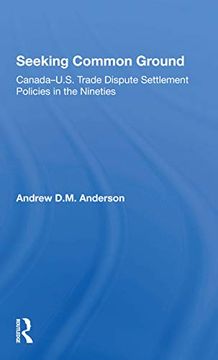Seeking Common Ground: Canadau. Se Trade Dispute Settlement Policies in the Nineties (in English)
Synopsis "Seeking Common Ground: Canadau. Se Trade Dispute Settlement Policies in the Nineties (in English)"
On January 1, 1989 the Canadian government began to implement the free trade deal that it had completed with the Government of the United States on October 4, 1987. Before signing the Canada-U.S. Free Trade Agreement (FTA) the Canadian government had sought exemption from the use by the United States of its 'unfair' trade law system of anti-dumping (AD) and countervailing duties (CVDs). While the U.S. 'unfair' trade law system is presumed to be based on principles agreed to in the General Agreement on Tariffs and Trade (GATT), economists, and other scholars, have contended that the system is not being applied properly; by reducing the harm caused by the margin of the foreigners' subsidy or dumping practices. Instead, it is being used to provide shelter to U.S. based corporations and industries seeking import relief, where shelter represents a type of administered trade protection, since the actions are undertaken and paid for by the U.S. government. This abuse came to represent a serious problem for Canadian producers in the1980s, who are extremely reliant on exports to the United States. To an increasing degree they believed they had become the target of U.S. trade law actions by their U.S. competitors. The United States was, however, not prepared to eliminate its 'unfair' trade law system for Canada, but instead, agreed to the setting up of two dispute settlement mechanisms (DSMs) where Canadian and American citizens could sit on binational panels to hear the final review of complaints lodged against the administrative agencies actions in either country on AD and CVD cases under Chapter Nineteen of the FTA or on general trade disputes under Chapter Eighteen of the FTA. This book critically examines the development and implementation of these two DSMs over the January 1, 1989 to August 15, 1994 period. It also provides a broader analysis of the issues surrounding the problems of the application of the 'unfair' trade laws, by examining the Canada-U.S. FTA's DSM systems against the present use by Canada and the United States of the procedures available under the 1979 GATT Subsidies Code. It also examines the changes that have been made in the 1994 GATT Subsidies Code and the North American Free Trade Agreement (NAFTA) which has incorporated, with revisions, Chapter Eighteen and Nineteen as Chapter Twenty and Nineteen of the NAFTA, respectively, and extended access to these mechanisms to Mexico. This book primarily focuses on the application of CVDs and the adverse international affects of governments subsidies practices, though many of the issues raised are also applicable to the application of AD duties and the private subsidization activities of firms. The book finds that, first; the Chapter Nineteen DSM may provide some short-term benefits to Canadian producers, but for ensuring the long-run 313stability of Canadian producers access to their U.S. markets, including the eradication of harassment by U.S. based producers using the 'unfair' trade laws, Canada still needs to push for major changes to the CVD and AD processes in the NAFTA mandated Working Groups. Second, if Chapter Eighteen, or now Twenty of the NAFTA, is going to best serve the interests of Canadian, American and Mexican citizens, then it is going to have to be seriously revised to take into account some type of consumer welfare criterion. As NAFTA is presently written it has a strong bias, carried over from the Canada-U.S. FTA, toward producer interests which may detract from the long run interests of consumers in the NAFTA area. The ability of groups who seek redress for the closing of markets in the NAFTA area by the three Parties to the Agreement is very weak at the present time.

